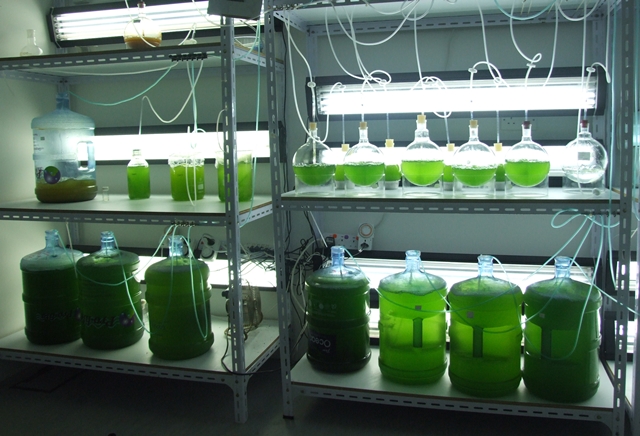There’s more to it than meets the eye:
DHI Singapore’s Plankton Group gets the max out of plankton, from ecology to business
Looking at them with the naked eye is not too thrilling. However, once you pick up a microscope, you get to know these organisms at their scale – and can surely expect some exciting insights. We’re talking about plankton - the tiny organisms that drift with the water currents. DHI Singapore has set up a group dealing with various aspects of plankton ecology all the way to possible business applications.
Some facts about plankton: Without them, breathing as well as eating would be hard. Phytoplankton - the plants among the plankton organisms - produces 50% of our oxygen. Their predator, zooplankton, forms a crucial food source for e.g. fish and sea birds. On the other hand, blooms of some plankton species cause disease and death if their toxins are transferred into the human food chain. Plankton also plays an important and complex role on our climate. Phytoplankton takes up carbon dioxide during photosynthesis. However, the whole planktonic community (phytoplankton, zooplankton and other organisms) releases carbon during respiration.
Understanding plankton biology and ecology is therefore of crucial importance to develop predictive models to improve coastal and marine management. Moreover, it is essential to sustainably manage food production or simply avoid natural disasters like toxic blooms or invasions through ballast water transport.
Our group in DHI Singapore is continuously growing, today we are five senior researchers and seven research assistants working daily on plankton issues. Our expertise ranges all the way from the ecology of phyto- and zooplankton to the application of this knowledge in business operations and comprise ballast water activities, aquaculture, ecotoxicology, biodiversity studies, behavioural ecology of plankton and fish as well as the development of forecasting tools.
On an everyday basis, the plankton group analyses plankton communities and their evolution in the water column on selected permanently monitored sites in Singapore. Another big chunk of our work concerns the ballast water centre, where plankton is grown in large scale to facilitate tests for ballast water treatment technology developers and analyse their samples. Developing new techniques and analytical methods allows us to increase efficiency in these time-consuming activities and continuously improve our expertise. The R&D-part of our team is here to back up these activities as well as to provide data for our modellers, who require measurements of the plankton’s vital signs (like growth rates, reproduction rates, respiration, grazing rates, etc.). These rates are then used to validate our forecasting models.

DHI Singapore’s Plankton group is growing – and so are various kinds of phyto- and zooplankton in our tanks and laboratories.
Moreover, the R&D group provides research for clients or governmental agencies, with good chances to spin off into future commercial activities for DHI. Today we have 3 such R&D projects with industry partners related to plankton which may raise interest beyond DHI:
1/ AMEWS (Aquatic Microbial Early Warning System): Development of ecological understanding, molecular probes and forecasting tools to predict toxic plankton blooms in Singapore waters
2/ DEN-SELECT: Culture Density and Selection effects on calanoid copepod cultures to provide fish larvae with high value live prey,
3/ Harpacticoid copepods: Development of harpacticoid copepod cultures for production of high value biomass to produce in fine micro-encapsulated diets.
In case you want to learn more about these projects or are otherwise interested in our expertise, don’t hesitate to get in touch!
On behalf of all the Singapore Plankton Group,
Guillaume Drillet
gdr@dhi.com.sg